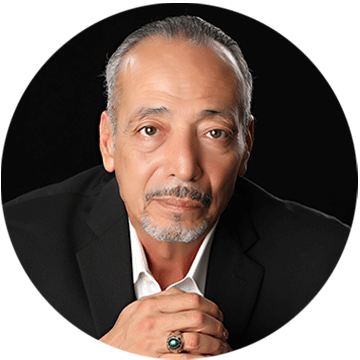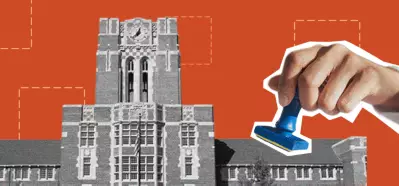Footsteps to follow: Alumni Mentor Program paves the way for future success of doctoral students

Written by Elizabeth Exline

The power of leading by example
Almost anyone who grew up with or is an older sibling knows full well how influential that relationship can be. From copying outfits to playing the same sports, younger siblings follow the lead of their older brothers and sisters in all manner of ways.
The same can be said for professional mentors. While you may not swap shirts or meet each other on the baseball field, mentors play such a powerful role in society and the workplace that there’s even a month dedicated to it. (January, in case you were wondering.)

At University of Phoenix (UOPX), this awareness led to the Alumni Mentor Program pilot, which paired 62 doctoral alumni with 62 doctoral students. The objectives centered on the power of connectivity, explains Dean of Operations for the College of Doctoral Studies John Ramirez, MBA. Not only would mentors be able to cultivate an ongoing relationship with the University, they could help shape future generations, as well.
“Oftentimes, when students start to work on their dissertation, they start to feel isolated,” Ramirez explains.
“They’re overwhelmed. [They wonder] why are they going through this. Why is it so difficult? … [But] by having alum who went through it and could say, ‘I've been there. I felt the same way, and here are some best practices,’ would assist with the [doctoral student] retention and progression.”
Jennifer Carriere can attest to that. As a doctoral alumna, she wanted to participate in the program as a way to give back. “My mentee was incredible — very driven! She wanted to know if how she felt was ‘normal.’ The stress is normal in a doctoral program, and she seemed to crave connection,” Carriere recalls.
Connection, as it turns out, was just the beginning. Here’s how it all played out.
Finding the perfect pair (x 62)
Not unlike a dating app, Ramirez and his team had to figure out the best way to match mentors with mentees. To do this, they started with the program’s framework. Mentors and mentees were tasked with meeting virtually one hour a month for six months, during which time alumni mentored doctoral students about such topics as leadership, leveraging alumni resources through UOPX, doctoral demeanor and so on.
When it came to selecting mentors from the 121 volunteers, Ramirez and his team considered a variety of factors, including:
- Academic background: Having a picture-perfect record wasn’t required. In fact, quite the opposite. “I wanted to have some alumni who may have struggled, who may have dropped out for a period of time,” Ramirez explains. Such alumni could relate to the mentees and provide a road map forward.
- Demonstration of scholar-practitioner-leader model: “We have CEOs, senior VPs and academic deans [among our alumni],” Ramirez says. “We have leaders in nursing and business and education. I needed to have alumni who could say, ‘I was in your position at one point, and I’ve been able to obtain this position because of A, B or C,’ and help guide them.”
- Commitment: Not only were mentors and mentees asked to commit to spending one hour a month in active connection, the mentors were asked to stay away from offering programmatic guidance (e.g., help with a dissertation) and instead focus on doctoral mentorship. “Students were constantly asking what happens after they get their degree,” Ramirez says. “Many of them assumed that as soon as they earned their doctorates, all these job opportunities and people would be knocking on their doors. … Utilizing our alumni to help them prepare for that transition — how do you network, how do you leverage all the knowledge you learned — [was the goal].”
- With mentors in place, Ramirez and his team set about matching them with mentees, who also hailed from a variety of backgrounds. Some were at the start of a program, others at the end. Some were successful, others less so. “I tried to find that sweet spot. How can we help all students and not just a select group,” Ramirez says.
- According to Carriere, those efforts paid off. “We had a bunch in common (background, life history) and that helped to build a bridge,” she says.
Learning goes both ways
Proving that the best programs teach everyone something, the Alumni Mentor Program offered some thought-provoking surprises.
For starters, many of the mentors weren’t quite sure how to do the actual mentoring. Ramirez assumed that, at mid- to senior level in their careers, most would be familiar with the mentoring process. “Ninety percent of them said, ‘Hey, can you provide me with lists of monthly topics, because I’m not really sure what to talk about,’” Ramirez says.
That turned into an opportunity. Ramirez and his team began to create monthly topics for discussion, a move that created program cohesion and real value for the mentees.
It also benefited the mentors. Discussing alumni resources at UOPX one month, for example, opened the eyes of alumni and students alike to resources neither knew existed. The Fellows in Residence program and the Dissertation to Publication workshops offered potential opportunity for both mentors and mentees.
Ramirez was also surprised by how fruitful the mentor-mentee connection could be. Participants routinely communicated more frequently than the required once-a-month check-in. Even today, Ramirez estimates 90% of the mentors and mentees who completed the program voluntarily stay in touch.
Carriere, for example, wanted to serve as a sounding board for her mentee. “I hope my mentee realized I was willing to listen,” she says. “We talked about not only the nuts and bolts of the program but also the reason for undertaking a doctoral program. I think the benefit came from recognizing you must take the journey alone, but you do not have to be lonely or isolated.”
Most interesting, however, was how mentors who had different industry or education experience than their mentees still had something to offer. In fact, those 20% of participants who were not matched according to program found themselves with plenty to share anyway.
“It was like, ‘Wait a minute, there are things we can share,’” Ramirez says. “Philosophies about working with others or leadership or managing were relevant regardless of industry, that [being in the same industry] really didn’t matter.
“It was a really exciting pilot,” he adds.
Version 2.0
The success of the Alumni Mentor Program pilot was considerable enough that the College of Doctoral Studies intends to roll out an expanded and official version in April 2023.
The platform may change in the next iteration, and the logistics of pairing hundreds of alumni and students rather than just 62 of each will present challenges.
The biggest hurdle, however, may be reaching the doctoral students who need the program the most. Whether struggling with the program or the time management that comes with going to school, raising a family and working, the students who are floundering are the ones Ramirez most wants to help through this program.
“How do we socialize with the students who really need that additional attention, who really could use and benefit from the help? How do we articulate that? How do we encourage that?” Ramirez says.
One option might be to host webinars that explain the program’s value. Another is word of mouth. Already some mentors from the pilot have asked to be part of the new program.
This commitment on the part of alumni to give back speaks to the life-changing nature of the doctoral program. Many alumni, Ramirez explains, feel grateful for the knowledge they acquire with their degree and want to give back. Others feel that, by helping students, they’re making a positive impact in their community.
For his part, Ramirez understands. There’s something powerful and rewarding about the close-knit doctoral community. It demands your care and attention, and, in return, it gives you perspective and knowledge.
“I love this college,” Ramirez says. “I love our students. I love what we do for our communities, and I really think that the graduates of our program are making a difference out there. That’s what fuels our fire at the college.”
Read more articles like this:

ABOUT THE AUTHOR
Elizabeth Exline has been telling stories ever since she won a writing contest in third grade. She's covered design and architecture, travel, lifestyle content and a host of other topics for national, regional, local and brand publications. Additionally, she's worked in content development for Marriott International and manuscript development for a variety of authors.
This article has been vetted by University of Phoenix's editorial advisory committee.
Read more about our editorial process.


